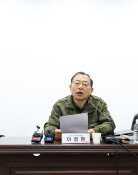Korea has no future without trade restructuring
Korea has no future without trade restructuring
Posted May. 29, 2023 08:13,
Updated May. 29, 2023 08:13
Among major countries, South Korea is the most vulnerable to the negative effects of global supply chain disruptions. This is a finding from an analysis by Seoul National University's Institute for Future Strategy on countries’ export and import structures. As supply chain issues have emerged as one of the biggest risks to the Korean economy, the battle over international supply chains is further intensifying, with participants in the U.S.-led Indo-Pacific Economic Framework (IPEF) agreeing to a pact to keep China in check.
According to the institute’s analysis, South Korea ranks first in the world in ‘import vulnerability,’ a measure of the likelihood of suffering damage from supply chain disruption by a certain country abroad. Asian countries Japan, Vietnam, Thailand, and India ranked second through fourth, all of which are close to China and have a large share of trade in their economies. In contrast, South Korea ranked 11th in ‘export power,’ a measure of a country's ability to influence global supply chains through the dominance of its exporters and products. China tops the list, followed by Germany, the U.S., Italy, and India.
South Korea's import vulnerability is due to its reliance on a handful of foreign countries for key equipment and raw materials needed to produce its flagship products. The country imports raw materials for electric vehicle batteries from China and semiconductor equipment and materials from the U.S., Japan, and the Netherlands. On the other hand, there are only a few products, such as memory chips, batteries, and shipbuilding, where the global supply chain gets disrupted if South Korea were excluded.
The vulnerable trade structure has been confirmed as a weakness of the Korean economy in recent years. Overall exports are being dragged down by declining export to China, which fell for 11 consecutive months until last month. The dependence on export to China was 19.5 percent in the first quarter of this year, down from 26.8 percent in 2018, but it still remains high. With China's economic recovery failing to meet expectations, South Korea's economy is feeling the pinch. Meanwhile, South Korea's share of China's imports fell to 7.5 percent last year, the lowest since 2001, as South Korea’s control over the Chinese market is waning.
Moreover, the movement to exclude China from global supply chains and reduce its influence is gaining momentum, with IPEF, a group of 14 nations including the U.S., South Korea, and Japan, having agreed to launch a network to counter China's weaponization of resources. The move could devastate the South Korean economy, which has relied heavily on China. We can hardly envision a bright future for the economy without a thorough overhaul of our trade and industrial structures, which have deteriorated for over a decade because of the illusion of semiconductor export booms.







